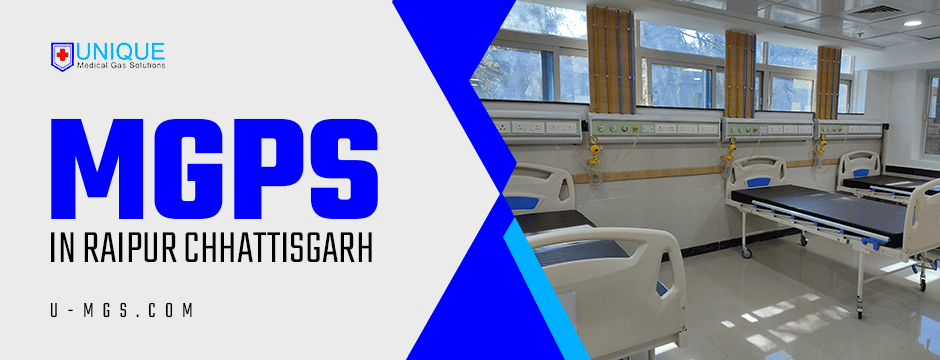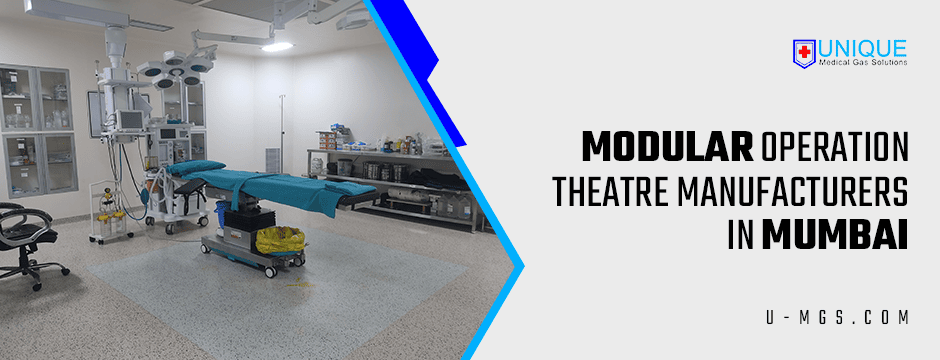In the fast‑evolving healthcare landscape of Raipur, Chhattisgarh, the adoption of state‑of‑the‑art infrastructure is transforming the quality of patient care. At the heart of this transformation lies the Medical Gas Pipeline System (MGPS), a critical lifeline that delivers essential gases—oxygen, medical air, vacuum, nitrous oxide—directly to Intensive Care Units (ICUs), operating theatres, and emergency bays. Unlike cylinder‑based supply, MGPS offers uninterrupted, centrally controlled delivery with built‑in safety measures, ensuring seamless operation of life‑support equipment.
This blog explores how MGPS in Raipur Chhattisgarh, are strengthening ICU functionality, enhancing patient safety, and paving the way for scalable, reliable healthcare, highlighting their design, monitoring, staff training, and emergency preparedness. With insights tailored for clinicians, hospital administrators, and facility planners, this piece examines the technical and operational underpinnings of MGPS-driven care excellence, spotlighting Raipur hospitals as models of resilience and precision in critical care delivery.

The Role of MGPS in ICU Resilience
Centralised, reliable gas delivery
An MGPS consolidates gas supply from sources like bulk liquid oxygen tanks, compressors, and cylinder manifolds, distributing it via colour-coded copper piping to designated zones (e.g. ICU, OT). This ensures:
- Zero downtime: Redundant sources switch automatically if one fails.
- Pressure stability: Design standards cap pressure drop at ≤ 5% even during peak usage.
In Raipur, major hospitals equipped with MGPS maintain continuous oxygen delivery, crucial during spikes in demand, such as during COVID‑19 surges or mass casualties.
Built‑in zoning & isolation
Area Valve Service Units (AVSUs) segment the pipeline into zones. This modular design supports:
- Safe maintenance: You can isolate one ICU wing without affecting other units.
- Emergency control: Quick shut‑off in case of leaks or contamination.
This strategic zoning enhances operational flexibility and minimises disruption during maintenance or urgent interventions.
Safety Mechanisms & Monitoring
Multi‑tier alarm systems
MGPS in modern Raipur hospitals integrate sensors at key points:
- Pressure monitoring at source, zone, and terminal levels.
- Automated alarms activate on anomalies—low pressure, source switch‑over, or pipeline leaks.
Staff receive instant alerts via audible panels and digital dashboards, enabling swift corrective action.
Compliance with safety standards
MGPS in Raipur Chhattisgarh, design aligns with NFPA 99, HTM 02‑01 (UK), ASTM, and EN norms, covering:
- Pipe material and sizing, pressure testing, cleaning and purging.
- Gas‑specific outlets to prevent cross‑connections.
- Colour coding and clear labelling throughout.
A study from New Delhi emphasised that patient safety depends on the rigorous design, installation, commissioning, and operation of MGPS. Raipur hospitals adopting these benchmarks significantly reduce the risks of gas mismanagement.
Impact on ICU Functionality
Seamless equipment integration
ICUs rely on ventilators, infusion systems, and suction devices, each requiring precise gas delivery:
- Ventilators need stable oxygen and medical air for respiratory support.
- Surgical ICU setups may use AGSS lines for anaesthesia waste removal.
MGPS guarantees the required pressure and purity for optimal functionality.
Operational efficiency gains
Centralised gas management simplifies logistics:
- No cylinder swapping: Reducing manual labour and risk of interruption.
- Cost‑effective management: Bulk purchase reduces per‑unit expenses.
- Lower accident rates: Less handling leads to fewer leaks or injuries.
Staff Training & Competency
Technical awareness
Clinicians and support teams in Raipur undergo training to:
- Understand pipeline anatomy—source, valves, terminal outlets.
- Identify and respond to alarm conditions.
- Operate AVSUs and emergency shut‑off valves.
This addresses documented gaps in MGPS awareness within clinical teams.
Simulation & emergency drills
Regular drills simulate low‑pressure scenarios, allowing staff to:
- Execute source switching.
- Safely isolate affected zones.
- Notify facility management and initiate backups.
These practices embed preparedness and reduce on-the-job stress during real events.
Maintenance, Auditing & QA
Scheduled checks
MGPS systems demand monthly leak-testing, pressure validation, filter inspection, and annual compliance audits.
Third‑party audits
Studies endorse third‑party inspections as vital to quality assurance. A recent audit report highlighted practices ensuring MGPS reliability across hospital zones.

Challenges & Opportunities in Raipur
Managing initial costs
MGPS installation by the best modular operation theatre manufacturers in Mumbai entails capital for tanks, pipeworks, valves, and alarms. Yet lifecycle savings—from reduced cylinder handling, fewer leak incidents, and labour efficiency—often offset upfront investments.
Ensuring expertise
Local facility managers need skilled partners for compliance, commissioning, and tech support. Collaborations with certified vendors and experienced engineers are key.
Scaling healthcare capacity
MGPS’s modular design supports future expansions—adding ICU beds, new OTs, or satellite units—without systemic overhaul.
Case Insight: Raipur ICU Network
While specific hospital names aren’t public, several leading tertiary centres in Raipur have upgraded their ICUs with MGPS:
- New build installations feature redundancy and zoning for up to 4 ICU sectors.
- Retrofits include copper pipeline upgrades, terminal outlet replacements, and alarm integration.
- Operational outcomes include improved equipment uptime, reduced cylinder logistics costs, and faster responses to gas supply alerts.
End Notes
MGPS in Raipur Chhattisgarh, is no longer a luxury—it’s a critical backbone for modern ICU care. In Raipur, its benefits are clear: Reliable, uninterrupted delivery of life‑support gases, enhanced safety via alarms, zoning, and compliance, Improved ICU operations and staff readiness, Economic value through reduced manual handling and waste, and Scalability to meet growing healthcare demands. For healthcare providers in Chhattisgarh, investing in robust MGPS infrastructure is investing in patient lives. If you’re seeking turnkey solutions—from design and compliance to commissioning and training—explore how Unique Medical Gas Solutions supports hospitals in transforming care delivery in Raipur.




No comment